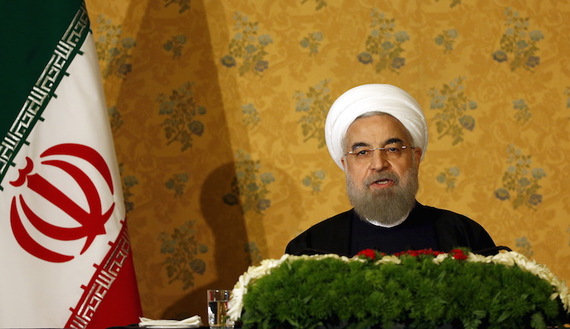Iran's Rouhani to Seek Unity After Election Underscores Divides

EghtesadOnline: President Hassan Rouhani promised to reach across Iran’s ideological and social divides after his successful campaign for re-election was dominated by arguments over deepening inequality.
The 68-year-old moderate cleric won a resounding victory in Friday’s presidential poll, as voters endorsed his efforts to steer the nation out of isolation through its landmark nuclear deal with world powers. Yet in the weeks leading up to the ballot debate had grown increasingly bitter as his conservative rivals castigated Rouhani for presiding over what they called an elitist administration that had failed to deliver real gains for ordinary Iranians, according to Bloomberg.
“I need the help of every single person in Iran, even those who opposed me and my policies,” Rouhani said on Saturday in a televised address hours after sealing victory. “I am extending my hand to all Iranians, all factions and all social groups,” he said, also citing the nation’s conservative-dominated security forces for praise.
The result strengthens Rouhani’s domestic mandate to integrate Iran with the global economy. But the extent of his success will depend on the cooperation of the Iran’s conservative establishment, led by Supreme Leader Ayatollah Ali Khamenei. He was widely seen as supporting Rouhani’s chief rival, fellow cleric Ebrahim Raisi, during the campaign. It will also depend on actions taken by U.S. President Donald Trump, who arrived on Saturday in Saudi Arabia for talks expected to focus on ways to contain the Islamic Republic’s regional influence.
Speaking alongside his Saudi counterpart in Riyadh Saturday, Secretary of State Rex Tillerson said he hoped Rouhani would use his mandate to enforce broad change.
The U.S. wants him to “begin the process of dismantling Iran’s network of terrorism” and put an end to ballistic missile testing, Tillerson said. “We also hope that he restores the rights of Iranians, the freedom of speech, the freedom of organization, so that Iranians can live the life that they deserve.” In Iran, security policy is dominated by conservative institutions overseen by Khamenei.
Rouhani secured 57 percent of ballots cast in a first round of voting, Interior Minister Rahmani Fazli said at a news conference in Tehran. Raisi, a hardliner, took 38.5 percent. More than 41 million of 56 million eligible voters cast ballots.
Shortly after final results were released, Khamenei had also urged Iranians to show unity following the “intensity of the days and weeks” leading up to the vote. European Union foreign-policy chief Federica Mogherini, a key figure in negotiating the 2015 nuclear accord, congratulated Rouhani on “a strong mandate” that would help fulfill the agreement. Germany’s defense minister, Ursula von der Leyen, welcomed what she called a “positive sign.”
Rouhani “will aim to influence the trajectory of both domestic and foreign policy towards moderation and greater opening with international powers,” said Ellie Geranmayeh, senior policy fellow at the European Council of Foreign Relations. “His renewed term promises tougher economic reforms inside the country to boost the confidence of foreign companies looking to invest in Iran.”
Bitter Campaign
Pre-election polls showed the Rouhani, 68, enjoying widespread backing in urban centers, where Iranians supported his efforts to deliver more social freedoms and trade a pared-back nuclear program for an easing of crippling economic sanctions. A large procession of Rouhani supporters on Saturday night filled one side of Tehran’s main thoroughfare, chanting and singing songs.
Raisi was popular among the working class and rural poor who rely on state support and benefited less from the nuclear pact. A Raisi win would have been viewed as swinging Iran back to a hardline conservatism hostile to the West.
Many had seen a tight race as Rouhani, first elected in 2013, brought his mixed record before the Iranian people. The lifting of some sanctions has brought billions of dollars of frozen funds into the country, but while companies have been eager to do business with Iran, fear of running afoul of remaining U.S. sanctions has put a damper on investment.
Monthly inflation has been tamed to less than 8 percent from above 40 percent, and the International Monetary Fund expects Iran’s economy to grow 3.3 percent this year after contracting by 6.8 percent in 2013. Rouhani’s hewed to fiscal prudence, promoted banking reform and engaged with foreign companies in an effort to revitalize an economy isolated from much of the world during a decade of sanctions.
Mideast Conflicts
Still, a combination of lower oil prices, reduced state subsidies and the Central Bank of Iran’s tight monetary policy have conspired to keep poorer Iranians from feeling any difference in their standard of living. Unemployment under Rouhani has edged up from 10 percent to 12.7 percent over the past four years, according to official figures.
Rouhani’s record on loosening restrictions on cultural and social activities has also been spotty as he tests how far he can push boundaries zealously guarded by hardline conservatives. While Tehran and other cities have seen a revival in the arts and cafe life, concerts were banned in Mashad, Iran’s second-largest and holiest city, after a prayer leader demanded they stop.
In his televised address, Rouhani told Iranians they had “said no to those who wanted to take Iran backward or cease its current course.” To the international community, he said that while the people wanted “engagement with the world away from extremism and violence,” they weren’t “prepared to live with threats and sanctions.”
Iran has become more enmeshed in conflicts throughout the Middle East in a widening confrontation with Saudi Arabia, as the region’s Shiite and Sunni heavyweights vie for influence in Iraq, Syria, Lebanon and Yemen. Rouhani will also continue to find himself facing a tougher Trump, who has pronounced the nuclear pact a “disaster” and imposed new punishments over Iran’s missile program on the eve of balloting.


